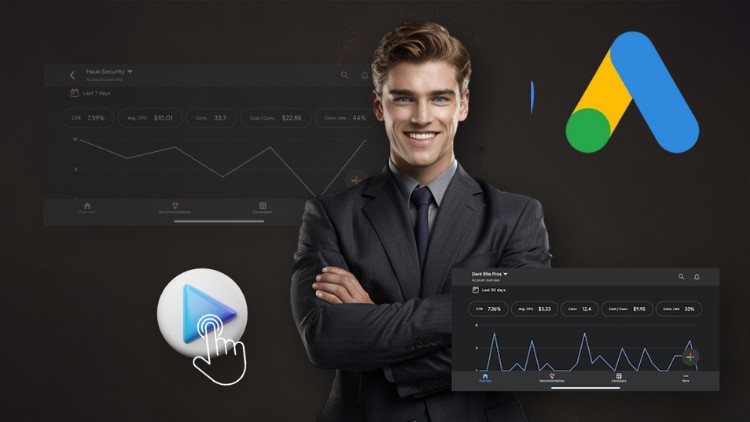
The Comprehensive Google Ads Course with 4 Practice Tests containing 400 Questions to crack Google Ads Certification!
What you will learn
Gain a deep understanding of how to navigate and use the Google Ads platform, including setting up and managing various types of ad campaigns
Learn to optimize ad campaigns by effectively utilizing keywords, targeting, bidding strategies, and budget management to maximize ROI and minimize costs.
Develop the ability to analyze campaign performance using Google Ads reports and Google Analytics, and make data-driven decisions to improve ad effectiveness.
Understand how to craft compelling ad copy and design engaging creatives that attract target audiences, drive higher click-through rates, and improve conversion
Why take this course?
The roles you’ve outlined each offer unique opportunities and challenges for professionals with expertise in Google Ads. Here’s a brief overview of how one might progress in these roles and the potential learning paths they could take:
- Consultant:
- Learning Path: Start with mastering the fundamentals of Google Ads, then deepen your knowledge on strategic planning, advanced targeting, and industry-specific optimization techniques. Coursework in digital marketing strategy, industry trends, and consulting skills will be beneficial.
- E-commerce Marketing Manager:
- Learning Path: Gain expertise in e-commerce marketing, learn about product feeds, shopping ads, and consumer behavior in online retail. Develop skills in analytics to understand sales funnels and conversion paths.
- Marketing Data Analyst:
- Learning Path: Focus on data analysis techniques, especially as they relate to digital advertising. Deepen your knowledge of Google Analytics, statistical analysis, and performance metrics. Understanding machine learning applications in marketing analytics can also be advantageous.
- Conversion Rate Optimization (CRO) Specialist:
- Learning Path: Learn A/B testing methodologies, conversion funnel optimization, and user experience best practices. Develop proficiency with landing page design tools and analytics platforms to test and measure improvements.
- Advertising Account Manager:
- Learning Path: Acquire client management skills and understanding of campaign performance reporting. Focus on strategic communication, account growth strategies, and campaign optimization for different industries.
- Social Media Advertising Specialist:
- Learning Path: Expand your knowledge of social media advertising platforms (Facebook Ads, LinkedIn Ads, Twitter Ads, etc.), ad copywriting tailored to each platform, and audience segmentation across channels.
- Chief Marketing Officer (CMO):
- Learning Path: Broaden your strategic skills in marketing, gaining expertise in overarching brand strategy, market analysis, competitive positioning, and leadership. Combine this with practical experience managing cross-functional teams and large-scale campaigns.
- Content Marketing Manager:
- Learning Path: Develop content strategy, SEO optimization, and integrated marketing communication skills. Understand how to leverage Google Ads alongside organic content for maximum visibility and engagement.
For each of these roles, staying updated with the latest features and best practices in Google Ads is crucial. This includes new ad formats, automation tools, machine learning capabilities, and integrating Google Ads with other marketing channels and analytics platforms. Additionally, a deep understanding of the target audience, market analysis, and an innovative mindset for campaign creation will set apart professionals in these roles.
‘;
}});
Key keywords to focus on when expanding your expertise could include:
- Google Ads course: To gain formal education or certification.
- Google Ads dashboard: For understanding performance metrics and data visualization.
- Digital marketing: A broad field encompassing Google Ads, but with a holistic approach to online advertising.
- Ad performance: To understand how ads are performing across different metrics like CTR, CPC, conversation rate, etc.
- Targeting techniques: For reaching the right audience efficiently, which could include demographic, geographic, contextual targeting, and remarketing.
- Ad optimization: To improve ad quality and ROI through A/B testing, ad rotation, ad extensions, and bid adjustments.
- New ad formats: Stay ahead of the curve by experimenting with innovative ad types that Google introduces periodically.
- Ad extensions: To enhance ads with additional information like location, phone numbers, or additional messaging for higher engagement.
- Marketing strategies: To develop comprehensive plans that integrate Google Ads with other marketing efforts.
- PPC advertising: While primarily focused on Google Ads, this term also covers PPC campaigns on other platforms.
- SEM (Search Engine Marketing): For understanding the broader context of paid search, including Google Ads.
- Advanced Google Ads: For mastering complex campaign structures and automation tools within the platform.
- Advertising tools: To leverage additional software and technologies that complement Google Ads and enhance its functionality.
By focusing on these areas, professionals can build a robust skill set that will serve them well in the evolving landscape of digital marketing and specifically in roles centered around Google Ads.
